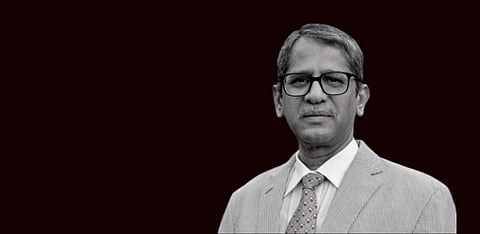

ON June 29, an open letter, written by more than 300 eminent lawyers, including Senior Advocates Indira Jaising and Anand Grover, researchers and activists committed to the rule of law, was addressed to the Chief Justice of India ('CJI'), N.V. Ramana stating, "We must express our agony that the state police justify the arrests on the basis of the Supreme Court judgment dated 24th June 2022, in the Zakia Jaffrey case."
Civil rights activist and journalist, Teesta Setalvad and former Director-General of Police in the Gujarat Police, R.B. Sreekumar, have been arrested for alleged forgery of evidence to falsely implicate innocent persons by the Gujarat police on the basis of a complaint filed by D.B. Barad, a police Inspector at the Ahmedabad Crime Branch, based on the following observation made by the Supreme Court in paragraph no. 88 of its judgment in Zakia Ahsan Jafri versus State of Gujarat & Anr.:
"At the end of the day, it appears to us that a coalesced effort of the disgruntled officials of the State of Gujarat alongwith others was to create sensation by making revelations which were false to their own knowledge. The falsity of their claims had been fully exposed by the SIT after a thorough investigation. Intriguingly, the present proceedings have been pursued for last 16 years (from submission of complaint dated 8.6.2006 running into 67 pages and then by filing protest petition dated 15.4.2013 running into 514 pages) including with the audacity to question the integrity of every functionary involved in the process of exposing the devious stratagem adopted (to borrow the submission of learned counsel for the SIT), to keep the pot boiling, obviously, for ulterior design. As a matter of fact, all those involved in such abuse of process, need to be in the dock and proceeded with in accordance with the law."
In Zakia Ahsan Jafri, the Supreme Court division bench of Justices A.M. Khanwilkar, Dinesh Maheshwari and C.T. Ravikumar observed that inaction or failure of the state administration cannot be a basis to infer a State-conspired crime against the minority community, dismissing the plea of the petitioner that the then Chief Minister of Gujarat, Narendra Modi and other state officials were in wilful dereliction of their duties to prevent the 2002 pogrom in Gujarat.
The letter expressed deep distress at the "hound[ing]" of Setalvad and Sreekumar "because they chose to pursue justice for the over 2000 people who were killed in Gujarat in February 2002," and requests that the Supreme Court suo motu clarify that the judgment in Zakia Ahsan Jafri did not intend to have any adverse legal consequence on the concerned persons.
The signatories of the letter have noted that notices for neither perjury nor contempt had been issued by the court to anyone in the proceedings of the case, despite which legal action had been initiated against Setalvad and Sreekumar, among others. Setalvad's NGO Citizens for Justice & Peace had, along with Jafri, filed a writ petition before the Gujarat High Court to consider the case of a larger criminal conspiracy against top state government and police officials in orchestrating the 2002 pogrom, and direct the Director-General of Police to lodge a first information report against these officials, in 2007. However, that petition was dismissed by the high court.
Moreover, the Supreme Court's statement "intriguingly, the present proceedings have been pursued for last 16 years" is perplexing, as per the letter's signatories. The meaning of this statement is open to be interpreted adversely to mean that the case had dragged on for so long intentionally by Jafri and those who assisted her petition. It points out that the case had travelled up from the Magistrate's court through the appellate process, in the duration of which the Supreme Court had itself ordered an investigation by a Special Investigation Team ('SIT') in 2008. The SIT submitted its closure report in 2012; thereafter, the Supreme Court had also requested an amicus curiae report on the matter. Both the reports were then sent to the Magistrate who had taken cognizance of the Gulbarg Massacre case. Thus, no one could be blamed for the delay over time, the letter emphasises.
In the absence of requisite intention of the Supreme Court in the present judgment, the arrests of Setalvad and Sreekumar violate the rule of law because any action against a person can only be initiated after giving due notice to the concerned person, the letter states.
The comments made by the Union Home Minister, Amit Shah post the judgment in a media interview that the "Supreme Court has clearly stated that the allegations were politically motivated", the signatories further write, caused the arrests by the Gujarat police, "sen[ding] a chilling message for the practice of law in the courts and for the rule of law in the country" as it indicates that whosoever pursues a case diligently in court runs a risk of being "put in the dock" if the court deems the cause as devoid of merits.
Concluding by seeking a clarification at the earliest against the course of retribution chosen by the Gujarat government, the letter warns that the absence of the same may lead to further consequences when the arrestees seek bail. It cautions that even during the National Emergency of the 1970s, the "court may have failed to stand up for the citizen in [ADM Jabalpur versus Shivkant Shukla (1976)], but it did not kick down those who chose to fight for citizens' causes in court."
Click here to view the full open letter.